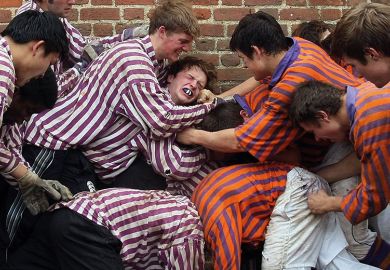Students from poorer backgrounds spend more time studying independently than those from more affluent areas despite also taking on more paid work, a major survey suggests.
The UK Engagement Survey, conducted by Advance HE and based on the responses of 34,635 students at 38 institutions, found that 49 per cent of students from the poorest 40 per cent of neighbourhoods said that they completed 11 or more hours of independent study in a typical week.
In contrast, only 47 per cent of respondents from the richest 60 per cent of areas, as measured by Participation of Local Areas (POLAR) data based on the proportion of children who enter higher education, reported doing so.
Undergraduates from more deprived areas are more likely to study for longer despite doing more paid work (56 per cent said that they had some paid employment, compared with 49 per cent from richer areas) and having more caring duties (30 per cent had some commitments, compared with 22 per cent from more affluent areas), the study adds.
“The data implies that those students facing the greatest demands on their time can often be the most resourceful and determined,” the study notes.
Students from low-participation backgrounds are also more likely to report that their academic skills, such as writing, speaking and problem-solving abilities, have been enhanced by their time at university, the study adds.
However, they are significantly less likely to be involved in university sport or societies, with only 43 per cent taking part, compared with 54 per cent of students from more affluent areas.
The evidence that poorer students may be working harder at university than their richer peers potentially sheds light on why those from state schools are more likely to earn a good degree from a UK university compared with similar students from private schools – a phenomenon demonstrated by repeated studies.
Jonathan Neves, head of business intelligence and surveys at Advance HE, said that the higher levels of engagement among lower-income students documented in the report could explain why these students outperformed their more affluent peers.
“They are interacting with staff more, reflecting more and spending more time in research and enquiry – all these things might feed through into academic performance,” Mr Neves said.
The heightened engagement and increased study hours among this cohort are “slightly surprising given the higher levels of commuting, caring and working for pay”, he added.
For the first time, the UK Engagement Survey, now its third year, also examined the experience of “commuter students” who spent at least 11 hours a week travelling to and from campus.
Some 10 per cent of respondents were identified as commuter students – although this rate nearly doubled for black students, of whom 19 per cent were commuters.
However, commuter students did not spend less time studying, the survey indicates, In fact, they were significantly more likely to devote at least 11 hours or more each week to independent study, with 66 per cent doing so, compared with 45 per cent of non-commuter students.
With these students also more likely than non-commuters to be balancing paid work, volunteering and caring commitments, the data suggest that they have “high levels of motivation, organisation and commitment”, the report concludes.
Register to continue
Why register?
- Registration is free and only takes a moment
- Once registered, you can read 3 articles a month
- Sign up for our newsletter
Subscribe
Or subscribe for unlimited access to:
- Unlimited access to news, views, insights & reviews
- Digital editions
- Digital access to THE’s university and college rankings analysis
Already registered or a current subscriber?








